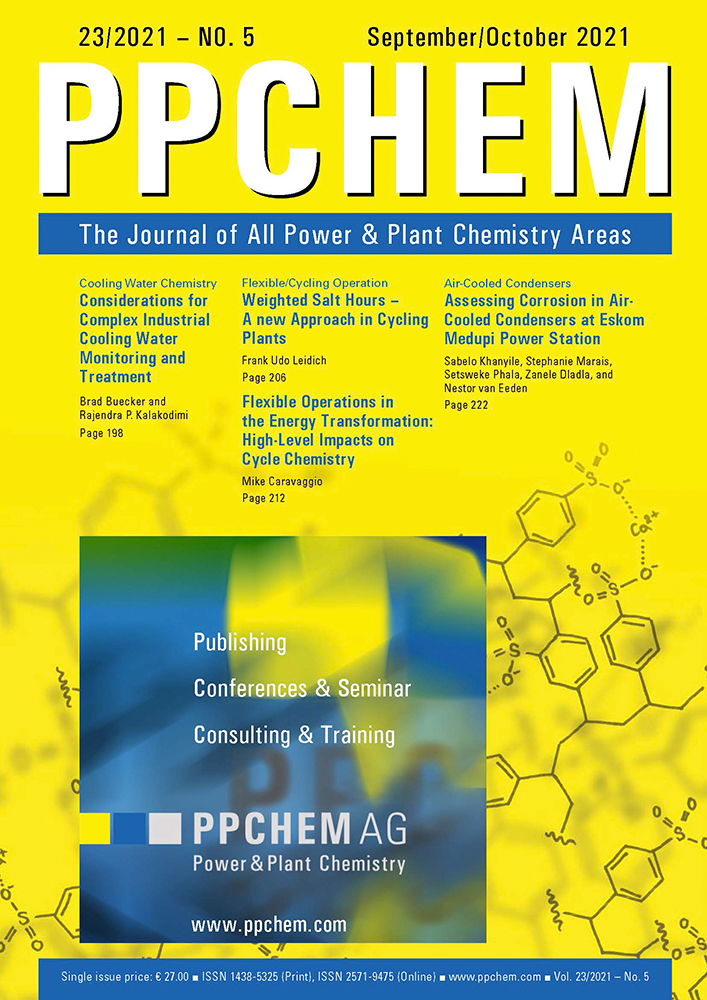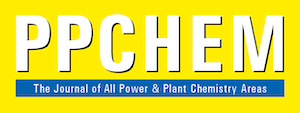
For members only
ABSTRACTS
Considerations for Complex Industrial Cooling Water Monitoring and Treatment
Brad Buecker and Rajendra P. Kalakodimi
Heat exchangers are, of course, a critical component of power and heavy industrial plants. Many of these are water cooled, with the source being a cooling tower (commonly known as an open cooling system) or sometimes once-through cooling. Often, “closed” systems are also present, which are cooled by primary heat exchangers, but whose chemistry is significantly different from that of open systems. Successful chemical treatment of the wide variety of cooling systems in plants requires analysis of many factors, including the potential for corrosion, scaling, and microbiological fouling, system metallurgy, operating temperatures, and others, all of which are examined in this article. Also discussed are several significant improvements to chemical treatment programs in recent years, improvements that maintain proper heat transfer and reliability of cooling systems.
PPCHEM® 2021, 23(5), 198–205
For Members only
Weighted Salt Hours – A New Approach in Cycling Plants
Frank Udo Leidich
Thus far, the chemist in a power plant has quite often been regarded as a necessary evil or as inevitable costs. To leverage the activity of the power plant chemist and make his/her work observable and tangible in an economic sense to the management, it is proposed to introduce a new parameter, weighted salt hours, that can be used to link the key chemistry parameters with key economic performance indicators. To do this, data mining and application of statistical methods, like gauging of repeatability and reproducibility, multifactor analysis, and others analyses, are needed. Of course, such efforts can only be successful if a very high number of power plants participate and contribute to this.
PPCHEM® 2021, 23(5), 206–210
For Members only
Flexible Operations in the Energy Transformation: High-Level Impacts on Cycle Chemistry
Mike Caravaggio
Electricity generation is changing, and these changes impact all aspects of the plant. The following paper sets out some of the key changes and the high-level impacts on cycle chemistry in thermal plants. It is incumbent upon power plant chemists and chemical engineers to understand the details of how flexible operation affects their specific units, so that they can develop optimal, unit-specific solutions.
PPCHEM® 2021, 23(5), 212–220
For Members only
Assessing Corrosion in Air-Cooled Condensers at Eskom Medupi Power Station
Sabelo Khanyile, Stephanie Marais, Setsweke Phala, Zanele Dladla, and Nestor van
Eeden
Steam side surfaces of air-cooled condensers (ACC) are prone to corrosion. If the
corrosion mechanism is not understood and mitigated, it can lead to ACC tube failure(s),
and subsequent vacuum and/or condensate chemistry deterioration. Most importantly, the
total iron levels entering the condensate and feedwater systems will be much greater than
international guidance. This paper reports on the ACC corrosion assessment performed on
Unit 5 of Medupi power station. The ACC condensate chemistry is reviewed and the
“Dooley Howell ACC Corrosion Index” is reported. The latter was derived from the physical
inspections of the internal surfaces of the ACC. The inspections were conducted when the
unit was on all-volatile treatment, under oxidising conditions (AVT(O) regime), as well as
after transitioning to an oxygenated treatment (OT) regime. The benefits of transitioning
from AVT(O) to OT are also reported.
PPCHEM® 2021, 23(5), 222–228

